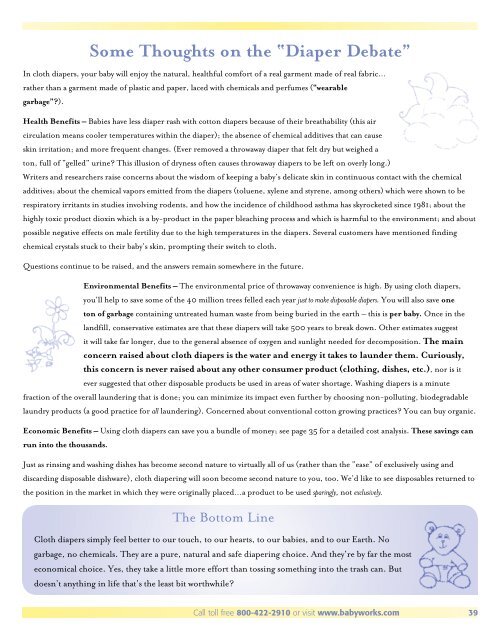20th Anniversary Catalog - Babyworks
20th Anniversary Catalog - Babyworks
20th Anniversary Catalog - Babyworks
You also want an ePaper? Increase the reach of your titles
YUMPU automatically turns print PDFs into web optimized ePapers that Google loves.
Some Thoughts on the “Diaper Debate”<br />
In cloth diapers, your baby will enjoy the natural, healthful comfort of a real garment made of real fabric…<br />
rather than a garment made of plastic and paper, laced with chemicals and perfumes (“wearable<br />
garbage”?).<br />
Health Benefits – Babies have less diaper rash with cotton diapers because of their breathability (this air<br />
circulation means cooler temperatures within the diaper); the absence of chemical additives that can cause<br />
skin irritation; and more frequent changes. (Ever removed a throwaway diaper that felt dry but weighed a<br />
ton, full of “gelled” urine? This illusion of dryness often causes throwaway diapers to be left on overly long.)<br />
Writers and researchers raise concerns about the wisdom of keeping a baby’s delicate skin in continuous contact with the chemical<br />
additives; about the chemical vapors emitted from the diapers (toluene, xylene and styrene, among others) which were shown to be<br />
respiratory irritants in studies involving rodents, and how the incidence of childhood asthma has skyrocketed since 1981; about the<br />
highly toxic product dioxin which is a by-product in the paper bleaching process and which is harmful to the environment; and about<br />
possible negative effects on male fertility due to the high temperatures in the diapers. Several customers have mentioned finding<br />
chemical crystals stuck to their baby’s skin, prompting their switch to cloth.<br />
Questions continue to be raised, and the answers remain somewhere in the future.<br />
Environmental Benefits – The environmental price of throwaway convenience is high. By using cloth diapers,<br />
you’ll help to save some of the 40 million trees felled each year just to make disposable diapers. You will also save one<br />
ton of garbage containing untreated human waste from being buried in the earth – this is per baby. Once in the<br />
landfill, conservative estimates are that these diapers will take 500 years to break down. Other estimates suggest<br />
it will take far longer, due to the general absence of oxygen and sunlight needed for decomposition. The main<br />
concern raised about cloth diapers is the water and energy it takes to launder them. Curiously,<br />
this concern is never raised about any other consumer product (clothing, dishes, etc.), nor is it<br />
ever suggested that other disposable products be used in areas of water shortage. Washing diapers is a minute<br />
fraction of the overall laundering that is done; you can minimize its impact even further by choosing non-polluting, biodegradable<br />
laundry products (a good practice for all laundering). Concerned about conventional cotton growing practices? You can buy organic.<br />
Economic Benefits – Using cloth diapers can save you a bundle of money; see page 35 for a detailed cost analysis. These savings can<br />
run into the thousands.<br />
Just as rinsing and washing dishes has become second nature to virtually all of us (rather than the “ease” of exclusively using and<br />
discarding disposable dishware), cloth diapering will soon become second nature to you, too. We’d like to see disposables returned to<br />
the position in the market in which they were originally placed…a product to be used sparingly, not exclusively.<br />
The Bottom Line<br />
Cloth diapers simply feel better to our touch, to our hearts, to our babies, and to our Earth. No<br />
garbage, no chemicals. They are a pure, natural and safe diapering choice. And they’re by far the most<br />
economical choice. Yes, they take a little more effort than tossing something into the trash can. But<br />
doesn’t anything in life that’s the least bit worthwhile?<br />
Call toll free 800-422-2910 or visit www.babyworks.com<br />
39


